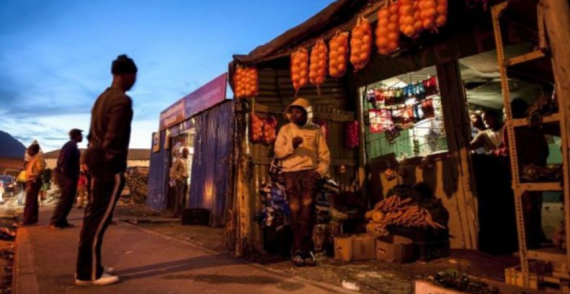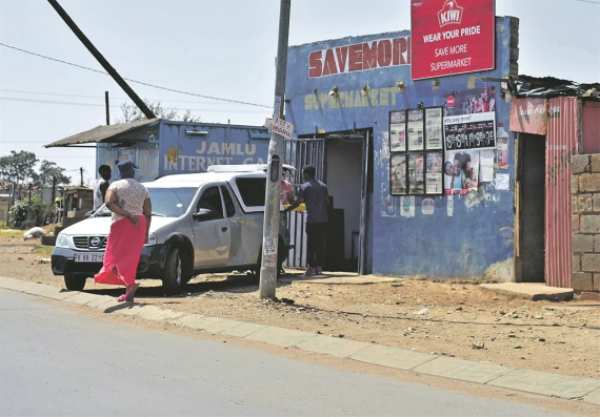While formal companies may have built up reserves, can access debt financing or can afford insurance against loss of income, informal businesses often live hand-to-mouth and thus need to operate daily to survive.
Government’s stimulus packages and measures to limit business failures and job losses focus primarily on the formal sector, ignoring the informal economy of businesses most susceptible to shock and operating in the most vulnerable communities.
Brett Hamilton, visiting lecturer in corporate finance at the University of Stellenbosch Business School, says the value of this sector is highly underestimated with StatsSA reporting that the informal sector accounted for 5.2% of South Africa’s GDP in 2015 and employed 2 641 000 individuals (17% of all employed) in 2016.
“Viewing the informal and formal sectors as two separate market participants is erroneous and has led to ineffective policy to support and develop the informal economy,” he argues. “What Covid-19 has shown is just how interconnected economies and markets are, and that the formal and informal sectors are no different.
“South Africa’s response to the pandemic has starkly highlighted the inequitable treatment and negative perceptions of the informal sector which actually plays a key role in the overall economy.”
Hamilton says that because little is known of the “shadow” economy, the sector is easily overlooked or ill-considered during policy formulation, disregarded in business strategy and too easily associated with nefarious activities.
“The view that all informal goods are counterfeit, that all traders are illegal immigrants and do not comply with regulations is anecdotal and, in most cases, false,” he says.
The informal “muti” market is estimated to be worth between R3-billion and R6-billion, while there are about 120 000 spaza shops contributing between R100-billion and R200-billion per year to the economy, and the township fast-food market alone is worth an estimated R80-billion per year.
Hamilton says despite the size of the informal economy, businesses in this sector are extremely vulnerable to external shocks. While formal companies may have built up reserves, can access debt financing or can afford insurance against loss of income, informal businesses often live hand-to-mouth and thus need to operate daily to survive.
“The impact on unemployment and business continuity on this sector as a result of the public health crisis will be immediate and severe,” he warns.
The value of the informal economy
Hamilton says it is easy to assume that informal trade exists as a result of joblessness alone, but this does not consider its true value.
He argues: “The informal sector does act as a safety net for the formal economy, in turn enabling the unemployed and unemployable to find work or start their own businesses, boosting income and alleviating poverty. But it also offers goods and services in areas that may be impossible or unattractive for formal networks to operate. The co-operatives and small medium and micro Enterprises (SMMEs) in these areas have an important role to fulfil.”
Usually these businesses, such as laundromats, flea markets and street vendors, operate in rural or informal areas and are considered informal since they are rarely registered at national or regional levels, are cash-based, don’t pay taxes and usually do not have formal arrangements with employees.
“This sector also offers goods in a manner more suited to the needs of customers with pre-packed smaller portions or single units that are more affordable,” Hamilton says. “For example, Parmalat used the spaza shop network to promote and sell its individually-packaged single-serve cheese products, which now contribute more than R1-billion to its revenue. The informal sector sources most of its goods from the formal economy and further pays rent to landlords and is clearly an important participant in the value chains of even large companies.”
What can government do?
Hamilton says that although the government has established the ministry of small business development to grow the contribution of SMMEs in the economy, this is mostly focused on formal businesses.
“What we need is adequate relief packages, but obvious issues include: Who do you include and exclude from these relief packages? How much can and should be offered? How will the funds be distributed? A lack of data makes this very difficult to solve other than to follow either a blanket approach (such as a Covid-19 grant) or requiring the formalisation of applicants.”
He suggests the following approach to both short-term relief from the impact of Covid-19 on the informal sector, as well as measures to support the sector beyond the pandemic:
Funding
The government has launched a Spaza relief fund for stock purchases, but it comes with strict formalisation requirements. Stores are required to register with the CIPC, Sars and UIF, and will only qualify for bulk-buying discounts from pre-approved suppliers. They are also required to submit financial records.
These measures may appear reasonable but will take time to implement and will also increase the complexity of doing business in the informal sector, which is beyond the means of many. The compliance requirements further limit the market activity of informal trade. For example, limiting purchases to a pre-selected list of suppliers undermines the ability to find the best possible prices on the day in the market and may impact long-standing supplier relationships.
Remove red tape
Bureaucracy is often cited as being a great burden on informal business. At the national level, government support comes with the expectation of rigid adherence, but with a lack of support and guidance on what is expected and how to comply. At the municipal level, zoning restrictions and other regulations as well as fees often restrict business activity rather than promoting it.
While control is naturally important, interventions are often applied using a blanket approach which treats the compliant and the non-compliant the same. A review of these measures has been called for to ensure that the informal sector is recognised for its role in a community as opposed to viewing it as a nuisance.
Basic infrastructure
The formalisation of the sector can be facilitated through the availability of adequate infrastructure, for example making demarcated areas available for informal trade, with shelter, storage facilities and sorting spaces. Even basic services, such as the availability of running water and ablution facilities, will go a long way in facilitating this economy.
These measures should be considered during the development of low-cost housing projects, ensuring that town planning considers the needs of informal businesses and their customers.
Training and development
Even informal businesses struggle to find qualified individuals to fill positions and in many cases the business owners themselves lack the skills to effectively manage a business. Skills development should be a major priority for development of the informal sector. This will not only allow it to become more sustainable, but will further assist in the transition of unskilled workers from the informal economy to skilled workers in the formal economy.
What can business do?
Formal businesses can support any of the measures already mentioned, but what is especially required is a careful analysis of a company’s value chain to better understand the role that informal business plays in its distribution channels. Having identified informal stakeholders, companies should assess their needs and develop strategies and activities to assist business continuity both during and after the crisis.
Extending current development efforts
Setting up new initiatives or delivery channels should form part of a long-term plan, but this will take time to develop and implement and may not be adequate to address the immediate need. In the short-term, companies should leverage current initiatives and support mechanisms, such as enterprise and supplier development programmes, to provide additional support.
Developing a micro-network through co-opetition
As current enterprise and supplier development programmes provide existing access to grass root firms and communities, it can also be made available to other companies to allow for quicker and greater access. Creating and connecting these micro-networks can become very powerful and have far reaching implications in terms of scale.
This will require engagement at a strategic level between incumbents to identify possible shared stakeholders and shared needs. At a board level this will require clear guidelines in terms of the goals that the initiative aims to achieve and what level of interaction will be required and allowed between competitors.
Use other networks
If a company does not currently have programmes in place to access the informal economy by way of an established network, it may be able to leverage other networks within the community, such as schools, churches and NGOs.
The little things
Informal businesses will need assistance with stock availability, funding and administration. Simply contributing to the different government relief programmes will make an impact, while companies can also make their legal and accounting services available to assist informal businesses in meeting the requirements to access relief measures. For example, advising on the specific government requirements, setting up basic financial accounts, registering with SARS, CIPC and UIF, drafting simple employment contracts, and the like.
Assistance will also be required to set up business bank accounts and access debt finance which may require formal businesses to offer surety or guarantees against loans or offering a payment relief programme to informal customers to assist with cash flow management.
The informal sector forms an integral part of the economy and, in many cases, there is interdependency between the informal and formal sectors. During the crisis and after, it will be important to support the most vulnerable in society – ensuring that the informal safety net remains strong is a social and business prerogative.
Article Source: https://mg.co.za/article/2020-04-24-covid19-stimulus-informal-economy/





